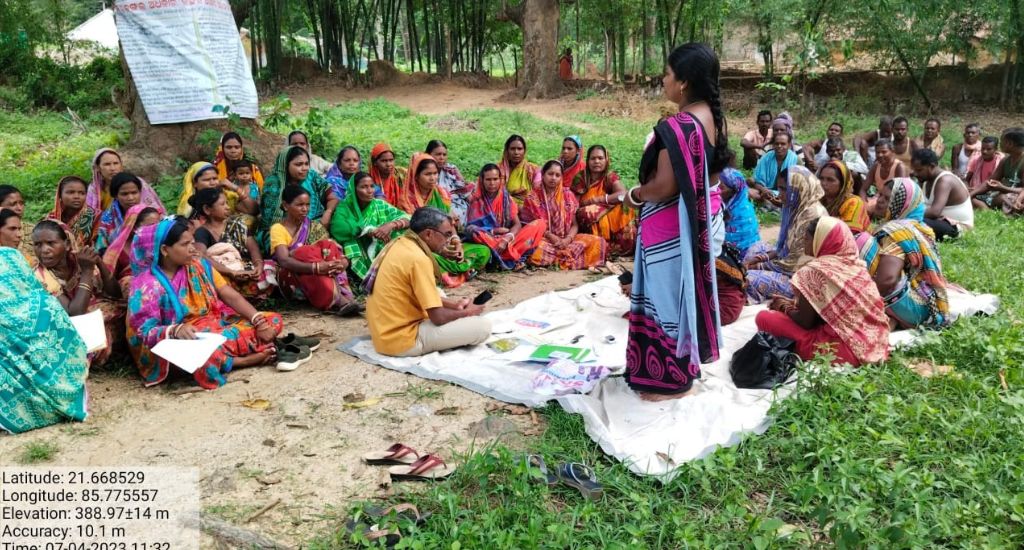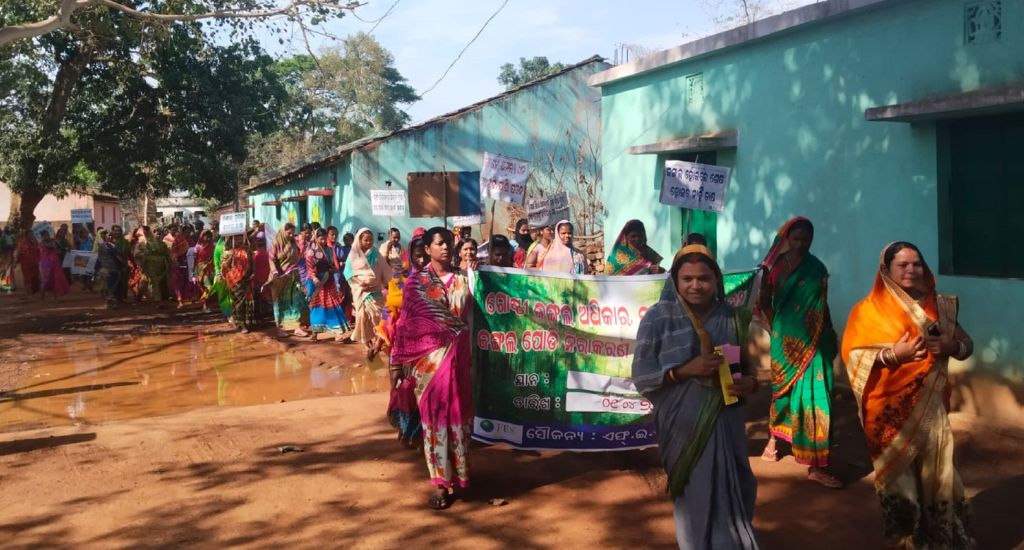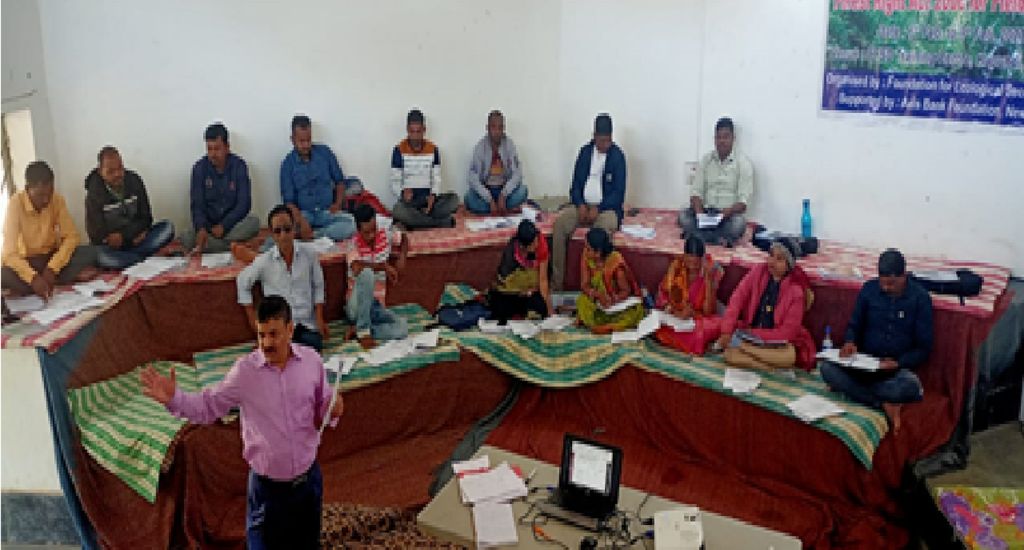
Field trainers help Odisha villagers claim forest rights
With the help of trained field trainers, forest-dependent villagers of Keonjhar in Odisha are now increasingly able to file their claim for their rights under the Forest Rights Act.

With the help of trained field trainers, forest-dependent villagers of Keonjhar in Odisha are now increasingly able to file their claim for their rights under the Forest Rights Act.
As a child, while crossing the narrow forest lane to reach her school, Bhagabati, a resident of Keonjhar in Odisha, used to ask her father, “Bapa! ay jungle kaharo (Father, whom does this forest belong to)?” And her father would say, “Amoro (ours)”.
But deep inside, Bhagabati’s father felt that they may have to abandon the forest some day, like the neighbouring panchayat had to, when people were relocated for mining activities in their villages. The forests and neighbouring villages were home to many like Bhagabati.
Married at 18, Bhagabati’s life was that of a typical homemaker. Now 33, she followed the routine for many years.
When Bhagabati Mahanta’s husband migrated outside the state for work, she had to stay back in Patna block of Odisha with their 14-year-old son. That’s when she decided to do something for the forest and forest dwellers of her region and joined the Mission Shakti of Odisha.
In December 2022, Mahanta joined the Foundation for Ecological Security (FES) as a field trainer. She attended a three-day training on the Forest Rights Act (FRA). The issues discussed seemed complex to her. But her initial anxiety was gone when she heard the song “Gaon chhodob nahi, jungle chhodob nahi (We will not leave the village nor the forest)” during the closing session.
Also Read: Forest Rights Act: Perils of slow implementation
After listening to the song and realising the injustice done toward the tribes throughout the years, her resolve to do something for her community grew stronger.
Mahanta realised that for generations, communities managed the forests but control lay with the rulers. Under British rule, forests were colonised and the forest department claimed authority for ‘scientific management’. After Independence, outdated rules persisted, branding forest dwellers as encroachers.

Recognising this, the Indian government enacted the Forest Rights Act in 2006. This legislation aimed to rectify historical injustice and acknowledge the right of forest communities to their lands.
Despite their ancestral ties, local communities have neglected recording their rights, with the belief that no one can displace them. But history tells a different story, emphasising the urgency needed in documenting and asserting their rights for long-term security.
Keonjhar, a district that lies in northeastern Odisha, is characterised by a rural-tribal mix, including particularly vulnerable tribal groups (PVTGs) such as the Juangas and the Bhuinas. The remote location of the district fosters a unique connection for the people between their forest-dependent lifestyle and their surroundings. But the people’s limited awareness about their rights has made targeted development initiatives necessary.
The effective implementation of FRA requires collaboration among government pillars like revenue, forest and tribal departments, and the Panchayati Raj Institution.
Though FRA was enacted over a decade ago, only 10 percent of the potential villages in Keonjhar have secured titles. Limited knowledge among officials and communities hinders progress.
Also Read: Women shed ‘forest encroachers’ tag, turn land owners
The FES introduced a cascading model, conducting district-level and block-level workshops, and panchayat-level training programmes to enhance the capacities of government and field functionaries. Simultaneously, community awareness campaigns were conducted through rallies, posters and leaflets, followed by training programmes for forest rights committees (FRCs), to bridge the information gap and empower local communities in claiming their rightful forest titles.
After completing the training at FES, Mahanta approached the sarpanch of a nearby panchayat, but was met with a lack of interest. She redirected her efforts to another panchayat with a woman sarpanch, and told her about the forest’s vital role in sustaining families during lean months, emphasising the potential loss without recorded rights. This time, her efforts bore fruit as the sarpanch immediately issued notices for panchayat-level training and for holding the gram sabha, to initiate the claim process.
News of Mahanta’s advocacy reached her own panchayat, Tangarpada. The sarpanch there promptly issued similar notices, commencing the claim process simultaneously in two panchayats encompassing 15 villages. Buoyed by these positive responses from the two gram panchayats, Mahanta embraced the challenging task ahead with a sense of accomplishment and renewed determination.
Initially the gram sabhas in almost all the villages saw low attendance. Mahanta then sought the support of the women’s self-help groups (SHG). She also collaborated with fellow field trainers, and organised a march throughout the block.

Recognising the physical constraints of attending all the villages personally for documentation, decided to assemble a team of volunteer village resource persons. She guided them to play a crucial role in assisting the FRCs with the preparation of claim documents. She simultaneously engaged with the key government departments, fostering communication for the smooth implementation and documentation of the Forest Rights Act in Patna block.
Amid the smooth progress, conflict erupted among villages just before a crucial joint meeting was to happen concerning the demarcation of boundaries. Villages sharing forest boundaries struggled to reach a consensus on their traditional boundaries.
Mahanta swiftly intervened, instructing one FRC representative from each panchayat to issue a notice for a panchayat-level joint meeting. FRC members, village leaders, ward members and sarpanchs gathered, facilitating a collective effort to demarcate traditional boundaries. The decision in this meeting was deemed final, fostering a mutual understanding among all the 15 villages.
Also Read: Kadar tribes face repeated displacement for hydel power projects
After overcoming the challenges, the perseverance and strategic interventions of Mahanta bore fruit. In November 2023, all the 15 villages of Patna block submitted their claim files to the tahsildar. This was a significant milestone in their journey to secure their long-overdue forest rights.
“I faced challenges, but my voice became the catalyst for change, uniting our community to reclaim our forest rights. This makes me happy,” said Mahanta.
The dedicated efforts of field trainers like Mahanta extended across all the 13 blocks of Keonjhar, reaching 1,791 villages. In November, a significant stride was made with the submission of 162 claim files in Harichandanpur, Ghatagaon, Saharpada, Patna, Telkoi and Sadar blocks. This exemplifies the fact that collective commitment enables people to secure their forest rights.
The lead image at the top shows a forest rights committee-level training in progress. (Photo courtesy Bhagabati Mahanta)
Saswatik Tripathy and Kartik Chandra Prusty are senior project managers at FES, Keonjhar.